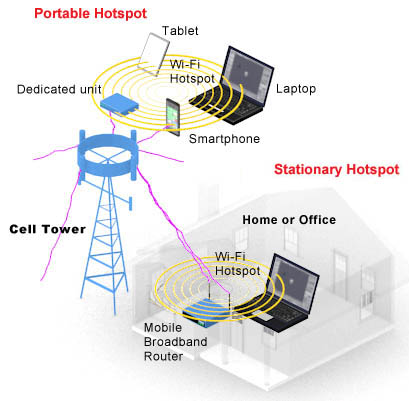Term of the Moment
Dolby Digital
Redirected from: personal Wi-Fi hotspot
Definition: cellular hotspot
A cellular hotspot converts cellular signals to Wi-Fi and vice versa to provide Internet access. A local hotspot is created by the following methods (see Wi-Fi hotspot).
Smartphone Hotspots
Smartphones have both cellular and Wi-Fi built in, and most phones can cross-connect the two to become a portable hotspot for nearby laptops and tablets. Also called "tethering."
Mobile Hotspots
Carriers may offer customers a portable device that becomes a local hotspot. Called a "portable hotspot," "personal hotspot," "mobile Wi-Fi," "mobile router," "mobile wireless router" or "travel router," either the fee is added to the user's existing data plan or a new plan must be activated.
Vehicle Hotspots
Built-in units provide a Wi-Fi hotspot within the cabin of a car or truck. In-vehicle cellular hotspots are available for many makes and models, and third-party devices can plug into the car's diagnostic port (see OBD).
Fixed Cellular
Cell towers may provide Internet access directly to a home or office. The cellular carrier provides the customer with a "mobile broadband router," which is a Wi-Fi base station that provides the local hotspot. See mobile broadband router. See Wi-Fi vs. cellular.

Portable or Stationary

Take It With You
Smartphone Hotspots
Smartphones have both cellular and Wi-Fi built in, and most phones can cross-connect the two to become a portable hotspot for nearby laptops and tablets. Also called "tethering."
Mobile Hotspots
Carriers may offer customers a portable device that becomes a local hotspot. Called a "portable hotspot," "personal hotspot," "mobile Wi-Fi," "mobile router," "mobile wireless router" or "travel router," either the fee is added to the user's existing data plan or a new plan must be activated.
Vehicle Hotspots
Built-in units provide a Wi-Fi hotspot within the cabin of a car or truck. In-vehicle cellular hotspots are available for many makes and models, and third-party devices can plug into the car's diagnostic port (see OBD).
Fixed Cellular
Cell towers may provide Internet access directly to a home or office. The cellular carrier provides the customer with a "mobile broadband router," which is a Wi-Fi base station that provides the local hotspot. See mobile broadband router. See Wi-Fi vs. cellular.

Cellular-based Wi-Fi hotspots can be created when traveling or in the home and office.

The advantage of a mobile hotspot is its portability.